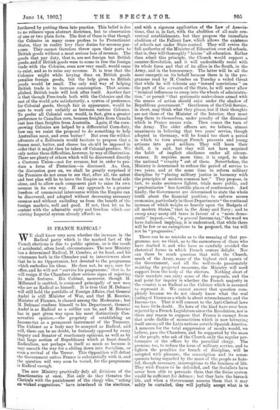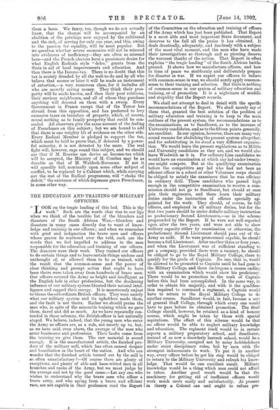IS FRANCE RADICAL?
WE shall know very soon whether the increase in the Radical party which is the marked fact of the French elections is due to public opinion, or is the result of accidental, often local, circumstances. The new Ministry has a determined Radical, M. Combes, at its head, and his utterances both in the Chamber and to interviewers show that he is no Opportunist, but devoted to the programme which embodies his ideas. He does not, he says, care for office, and he will not "survive his programme,- that is, he will resign if the Chambers show serious signs of rejecting its main features. His Cabinet, moreover, though M. Millerand is omitted, is composed principally of new men who are as Radical as himself. It is true that M. Delcasse will still hold the portfolio of Foreign Affairs, that General Andre is still Minister of War, and that M. Rouvier, Minister of Finance, is classed among the Moderates ; but M. Delcass6 confines himself to his Department, General Andre is as Radical as a soldier can be, and M. Rouvier has in part given way upon his most distinctively Con- servative opinion,—the propriety of establishing an Income-tax as a permanent instrument of the Treasury. The Cabinet as a body may be accepted as Radical, and will, there can be no doubt, be furiously opposed by every Deputy and Senator of reactionary opinions, as well as by that large section of Republicans which at heart dreads Radicalism, not perhaps in itself so much as because it may smooth the way for a sliding down into Socialism, or even a revival of the Terror. This Opposition will defeat the Government unless France is substantially with it, and the question will very soon be tested, for the programme is Radical enough.
The new Ministry practically defy all divisions of the Reactionaries at once. Not only do they threaten the Clericals with the punishment of the clergy who, "acting on wicked suggestions," have interfered in the elections, tions, that is, in fact, with the abolition of all male con- ventual establishments, but they propose the immediate abolition of the Falloux Law, which allows the existence of schools not under State control. They will revive the full authority of the Ministry of Education over all schools, that is, they will thoroughly " laicise " all education. Rather than admit this principle, the Church would support a counter-Revolution, and it will undoubtedly resist with its whole force and that of its allies in the South, in the Army, and in the bureaucracy. The latter will be all the more energetic on its behalf because there is in the pro- gramme read by M. Combes on Tuesday a veiled threat that while he will tolerate any "inward convictions" on the part of the servants of the State, he will never allow "inimical influences to creep into the wheels of administra- tion," or permit "that systematic malevolence armed with the means of action should exist under the shadow of Republican government." Gentlemen of the Civil Service, in short, may think what they please, but if their thoughts are not those of the Minister of the Interior, they must keep them to themselves, under penalty of the dismissal which in France means ruin. Then comes the turn of the Army. The older officers are, we believe, almost unanimous in believing that two years' service, though adopted in Germany, will be found too short a period in which to turn average French peasants and young artisans into good soldiers. They will learn their drill, it is said, but they will not have acquired the habit of implicit obedience under all circum- stances. It requires more time, it is urged, to take the national " vivacity " out of them. Nevertheless, the Ministry is determined to reduce the period of service to two years, and at the same time to reform military discipline by "placing military justice in harmony with the principles of modern common law." They propose, in fact, to make sentences lighter, trials more public, and " penitentiaries " less horrible places of confinement. And finally, the Government are determined to state the whole truth about the financial position; to enforce severe economies, particularly in those Departments "the continual increase of which weighs so heavily upon the Budgets of all modern States," that is, the Army and Navy ; and to sweep away many old taxes in favour of a "more demo- cratic" impost,—viz., "a general Income-tax," the word we have italicised implying, it is understood, that while there will be few or no exemptions to be proposed, the tax will not be "progressive."
There can be no mistake as to the meaning of that pro- gramme, nor, we think, as to the earnestness of those who have drafted it, and who have so carefully avoided the rhetorical forms in which French orators delight. Nor can there be much question that with the Church, much of the Army, many of the highest civil agents of the Government, and all the well-to-do passionately resisting the projected measures, the Ministry will need support from the body of the electors. Nothing short of their mandate can carry some of the proposals, and the real point for inquiry is whether the French majority in the country is as Radical as the Cabinet which is assumed to represent it. We cannot answer that question com- pletely because we do not clearly know what the real feeling of France as a whole is about retrenchments and the Income-tax. That it will consent to the Anti-Clerical laws we have little doubt. No laws of the kind have ever been rejected by a French Legislature since the Revolution, nor is there any reason to suppose that France is exempt from that acute dislike of monasticism which is now betraying itself among all the Latin nations outside Spanish America. A measure for the total suppression of monks would, we believe, pass the Chambers, and be supported by the mass of the people, who ask of the Church only the regular per- formance of the offices by the parochial clergy. The promise, too, to reduce the term of military service, and to lighten the penalties for breach of discipline, will be accepted with pleasure, the conscription and its conse- quences being regarded by the mass of the people as hate- ful, though necessary, interruptions to the business of life. They wish France to be defended, and the Socialists have never been able to persuade them that the Swiss system would be sufficient for defence ; but they hate the barrack life, and when a Government assures them that it may safely be curtailed, they will joyfully accept what is to them a boon. We fancy, too, though we do not actually know, that the change will be accompanied by an abolition of the privilege now enjoyed by the cultivated and the rich, of serving for only one year, and this, owing to the passion for equality, will be most popular. But we question whether severe economies will not be misread into evidences of inefficiency—they are often so misread here—and the French electors have a passionate desire for what English Radicals style "doles," grants from the State in aid of local improvements and education. And then there is the Income-tax. There is no doubt that this tax is acutely dreaded by all the well-to-do and. by all who believe that sooner or later it will be made an instrument of extortion,—a very numerous class, for it includes all who are secretly saving money. They think their pros- perity will be made known, and then their poor relations, their envious neighbours, and all of whom they purchase anything will descend on them with a swoop. Every Government in France except that of the Terror has shrunk from this opposition, and has preferred to levy excessive taxes on transfers of property, which, of course, reveal nothing as to family prosperity that could be con- cealed. All observers give the same account of the feeling of Frenchmen on this subject ; but we are bound to add that there is one weighty bit of evidence on the other side. Every Radical Member is pledged to support the tax, which must be held to prove that, if detested by a power- ful minority, it is not detested by the mass. The real fight will, however, rage round this subject, and we should say that if M. Rouvier can devise an Income-tax which will be accepted, the Ministry of M. Combes may be as durable as that of M. Waldeck-Rousseau. If not it will speedily fall, nominally upon some other subject of conflict, to be replaced by a Cabinet which, while carrying out the rest of the Radical programme, will "choke the deficit," the existence of which depresses grave Frenchmen, in some other way.











































 Previous page
Previous page